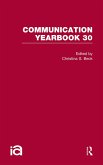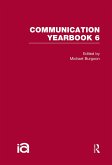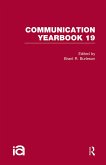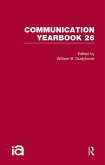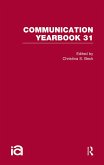Communication Yearbook 15
Herausgeber: Deetz, Stanley
Communication Yearbook 15
Herausgeber: Deetz, Stanley
- Broschiertes Buch
- Merkliste
- Auf die Merkliste
- Bewerten Bewerten
- Teilen
- Produkt teilen
- Produkterinnerung
- Produkterinnerung
First published in 2012. The Communication Yearbook 15 focuses on cultural studies and the social production of maning in relation to mass media messages. Included are significant issues in persuasion, language and dominance and interpersonal communication.
Andere Kunden interessierten sich auch für
![Communication Yearbook 16 Communication Yearbook 16]() Communication Yearbook 1670,99 €
Communication Yearbook 1670,99 €![Communication Yearbook 17 Communication Yearbook 17]() Communication Yearbook 1770,99 €
Communication Yearbook 1770,99 €![Communication Yearbook 30 Communication Yearbook 30]() Communication Yearbook 3069,99 €
Communication Yearbook 3069,99 €![Communication Yearbook 6 Communication Yearbook 6]() Communication Yearbook 651,99 €
Communication Yearbook 651,99 €![Communication Yearbook 19 Communication Yearbook 19]() Communication Yearbook 1969,99 €
Communication Yearbook 1969,99 €![Communication Yearbook 26 Communication Yearbook 26]() Communication Yearbook 2669,99 €
Communication Yearbook 2669,99 €![Communication Yearbook 31 Communication Yearbook 31]() Communication Yearbook 3170,99 €
Communication Yearbook 3170,99 €-
-
-
First published in 2012. The Communication Yearbook 15 focuses on cultural studies and the social production of maning in relation to mass media messages. Included are significant issues in persuasion, language and dominance and interpersonal communication.
Hinweis: Dieser Artikel kann nur an eine deutsche Lieferadresse ausgeliefert werden.
Hinweis: Dieser Artikel kann nur an eine deutsche Lieferadresse ausgeliefert werden.
Produktdetails
- Produktdetails
- Verlag: Routledge
- Seitenzahl: 698
- Erscheinungstermin: 1. Februar 2022
- Englisch
- Abmessung: 229mm x 152mm x 37mm
- Gewicht: 993g
- ISBN-13: 9781032243146
- ISBN-10: 1032243147
- Artikelnr.: 63002423
- Herstellerkennzeichnung
- Libri GmbH
- Europaallee 1
- 36244 Bad Hersfeld
- gpsr@libri.de
- Verlag: Routledge
- Seitenzahl: 698
- Erscheinungstermin: 1. Februar 2022
- Englisch
- Abmessung: 229mm x 152mm x 37mm
- Gewicht: 993g
- ISBN-13: 9781032243146
- ISBN-10: 1032243147
- Artikelnr.: 63002423
- Herstellerkennzeichnung
- Libri GmbH
- Europaallee 1
- 36244 Bad Hersfeld
- gpsr@libri.de
Stanley Deetz
Mass Entertainment, Audience Mediation, and Politics; 1: Mass Entertainment
and Community: Toward a Culture-Centered Paradigm for Mass Communication
Research; The Challenge of a Culture-Centered Paradigm: Metatheory and
Reconciliation in Media Research; Some Good News-Bad News About a
Culture-Centered Paradigm; 2: The Resourceful Reader: Interpreting
Television Characters and Narratives; The Active Viewer and the Problem of
Interpretation: Reconciling Traditional and Critical Research; At the
Intersection of Messages and Receivers: Enriching Communication Theory; 3:
Schema Theory and Measurement in Mass Communication Research: Theoretical
and Methodological Issues in News Information Processing; A Broader and
"Warmer" Approach to Schema Theory; 4: Insights into Soviet Life Provided
by Soviet Movies: Political Actors and Their Ideologies in the 1970s and
1980s; Politics and Aesthetics in the Cinema of Postrevolutionary
Societies; Mass Media Messages and Influence; 5: Encounters with the
Television Image: Thirty Years of Encoding Research; Closer Encounters with
Television: Incorporating the Medium; Cultural Studies and the Politics of
Encoding Research; 6: A Theory of Belief, Attitude, Intention, and Behavior
Extended to the Domain of Corrective Advertising; Deception,
Accountability, and Theoretical Refinement; Effects and Effectiveness of
Corrective Advertising: Assumptions and Errors in Regulation Research; 7:
Bridging Theory and Praxis: Reexamining Public Health Communication;
Bridging Theory "of" and Theory "for" Communication Campaigns: An Essay on
Ideology and Public Policy; Risk Communication: An Emerging Area of Health
Communication Research; 8: Public Issues and Argumentation Structures: An
Approach to the Study of the Contents of Media Agenda-Setting; Public
Issues, Agenda-Setting, and Argument: A Theoretical Perspective; The
Mediacentric Agenda of Agenda-Setting Research: Eclipse of the Public
Sphere; Interaction in the Social Context; 9: Dominance-Seeking Language
Strategies: Please Eat the Floor, Dogbreath, or I'll Rip Your Lungs Out,
Okay?; Thoughts About Floors Not Eaten, Lungs Ripped, and Breathless Dogs:
Issues in Language and Dominance; Gender and Dominance; 10: Communication
as the Interface Between Couples and Culture; Close Relationships in the
Physical and Social World: Dialectical and Transactional Analyses;
Communication, Intimacy, and the Course of Time; 11: The Politics of Common
Sense: Articulation Theory and Critical Communication Studies;
Communication, Postmodernism, and the Politics of Common Sense; The
Politics of Articulation and Critical Communication Theory; The Person in
Interaction; 12: Intrapersonal Communication: A Review and Critique;
Theoretical Choices That Clarify the Present and Define the Future;
Criteria for Evaluating Models of Intrapersonal Communication Processes
and Community: Toward a Culture-Centered Paradigm for Mass Communication
Research; The Challenge of a Culture-Centered Paradigm: Metatheory and
Reconciliation in Media Research; Some Good News-Bad News About a
Culture-Centered Paradigm; 2: The Resourceful Reader: Interpreting
Television Characters and Narratives; The Active Viewer and the Problem of
Interpretation: Reconciling Traditional and Critical Research; At the
Intersection of Messages and Receivers: Enriching Communication Theory; 3:
Schema Theory and Measurement in Mass Communication Research: Theoretical
and Methodological Issues in News Information Processing; A Broader and
"Warmer" Approach to Schema Theory; 4: Insights into Soviet Life Provided
by Soviet Movies: Political Actors and Their Ideologies in the 1970s and
1980s; Politics and Aesthetics in the Cinema of Postrevolutionary
Societies; Mass Media Messages and Influence; 5: Encounters with the
Television Image: Thirty Years of Encoding Research; Closer Encounters with
Television: Incorporating the Medium; Cultural Studies and the Politics of
Encoding Research; 6: A Theory of Belief, Attitude, Intention, and Behavior
Extended to the Domain of Corrective Advertising; Deception,
Accountability, and Theoretical Refinement; Effects and Effectiveness of
Corrective Advertising: Assumptions and Errors in Regulation Research; 7:
Bridging Theory and Praxis: Reexamining Public Health Communication;
Bridging Theory "of" and Theory "for" Communication Campaigns: An Essay on
Ideology and Public Policy; Risk Communication: An Emerging Area of Health
Communication Research; 8: Public Issues and Argumentation Structures: An
Approach to the Study of the Contents of Media Agenda-Setting; Public
Issues, Agenda-Setting, and Argument: A Theoretical Perspective; The
Mediacentric Agenda of Agenda-Setting Research: Eclipse of the Public
Sphere; Interaction in the Social Context; 9: Dominance-Seeking Language
Strategies: Please Eat the Floor, Dogbreath, or I'll Rip Your Lungs Out,
Okay?; Thoughts About Floors Not Eaten, Lungs Ripped, and Breathless Dogs:
Issues in Language and Dominance; Gender and Dominance; 10: Communication
as the Interface Between Couples and Culture; Close Relationships in the
Physical and Social World: Dialectical and Transactional Analyses;
Communication, Intimacy, and the Course of Time; 11: The Politics of Common
Sense: Articulation Theory and Critical Communication Studies;
Communication, Postmodernism, and the Politics of Common Sense; The
Politics of Articulation and Critical Communication Theory; The Person in
Interaction; 12: Intrapersonal Communication: A Review and Critique;
Theoretical Choices That Clarify the Present and Define the Future;
Criteria for Evaluating Models of Intrapersonal Communication Processes
Mass Entertainment, Audience Mediation, and Politics; 1: Mass Entertainment
and Community: Toward a Culture-Centered Paradigm for Mass Communication
Research; The Challenge of a Culture-Centered Paradigm: Metatheory and
Reconciliation in Media Research; Some Good News-Bad News About a
Culture-Centered Paradigm; 2: The Resourceful Reader: Interpreting
Television Characters and Narratives; The Active Viewer and the Problem of
Interpretation: Reconciling Traditional and Critical Research; At the
Intersection of Messages and Receivers: Enriching Communication Theory; 3:
Schema Theory and Measurement in Mass Communication Research: Theoretical
and Methodological Issues in News Information Processing; A Broader and
"Warmer" Approach to Schema Theory; 4: Insights into Soviet Life Provided
by Soviet Movies: Political Actors and Their Ideologies in the 1970s and
1980s; Politics and Aesthetics in the Cinema of Postrevolutionary
Societies; Mass Media Messages and Influence; 5: Encounters with the
Television Image: Thirty Years of Encoding Research; Closer Encounters with
Television: Incorporating the Medium; Cultural Studies and the Politics of
Encoding Research; 6: A Theory of Belief, Attitude, Intention, and Behavior
Extended to the Domain of Corrective Advertising; Deception,
Accountability, and Theoretical Refinement; Effects and Effectiveness of
Corrective Advertising: Assumptions and Errors in Regulation Research; 7:
Bridging Theory and Praxis: Reexamining Public Health Communication;
Bridging Theory "of" and Theory "for" Communication Campaigns: An Essay on
Ideology and Public Policy; Risk Communication: An Emerging Area of Health
Communication Research; 8: Public Issues and Argumentation Structures: An
Approach to the Study of the Contents of Media Agenda-Setting; Public
Issues, Agenda-Setting, and Argument: A Theoretical Perspective; The
Mediacentric Agenda of Agenda-Setting Research: Eclipse of the Public
Sphere; Interaction in the Social Context; 9: Dominance-Seeking Language
Strategies: Please Eat the Floor, Dogbreath, or I'll Rip Your Lungs Out,
Okay?; Thoughts About Floors Not Eaten, Lungs Ripped, and Breathless Dogs:
Issues in Language and Dominance; Gender and Dominance; 10: Communication
as the Interface Between Couples and Culture; Close Relationships in the
Physical and Social World: Dialectical and Transactional Analyses;
Communication, Intimacy, and the Course of Time; 11: The Politics of Common
Sense: Articulation Theory and Critical Communication Studies;
Communication, Postmodernism, and the Politics of Common Sense; The
Politics of Articulation and Critical Communication Theory; The Person in
Interaction; 12: Intrapersonal Communication: A Review and Critique;
Theoretical Choices That Clarify the Present and Define the Future;
Criteria for Evaluating Models of Intrapersonal Communication Processes
and Community: Toward a Culture-Centered Paradigm for Mass Communication
Research; The Challenge of a Culture-Centered Paradigm: Metatheory and
Reconciliation in Media Research; Some Good News-Bad News About a
Culture-Centered Paradigm; 2: The Resourceful Reader: Interpreting
Television Characters and Narratives; The Active Viewer and the Problem of
Interpretation: Reconciling Traditional and Critical Research; At the
Intersection of Messages and Receivers: Enriching Communication Theory; 3:
Schema Theory and Measurement in Mass Communication Research: Theoretical
and Methodological Issues in News Information Processing; A Broader and
"Warmer" Approach to Schema Theory; 4: Insights into Soviet Life Provided
by Soviet Movies: Political Actors and Their Ideologies in the 1970s and
1980s; Politics and Aesthetics in the Cinema of Postrevolutionary
Societies; Mass Media Messages and Influence; 5: Encounters with the
Television Image: Thirty Years of Encoding Research; Closer Encounters with
Television: Incorporating the Medium; Cultural Studies and the Politics of
Encoding Research; 6: A Theory of Belief, Attitude, Intention, and Behavior
Extended to the Domain of Corrective Advertising; Deception,
Accountability, and Theoretical Refinement; Effects and Effectiveness of
Corrective Advertising: Assumptions and Errors in Regulation Research; 7:
Bridging Theory and Praxis: Reexamining Public Health Communication;
Bridging Theory "of" and Theory "for" Communication Campaigns: An Essay on
Ideology and Public Policy; Risk Communication: An Emerging Area of Health
Communication Research; 8: Public Issues and Argumentation Structures: An
Approach to the Study of the Contents of Media Agenda-Setting; Public
Issues, Agenda-Setting, and Argument: A Theoretical Perspective; The
Mediacentric Agenda of Agenda-Setting Research: Eclipse of the Public
Sphere; Interaction in the Social Context; 9: Dominance-Seeking Language
Strategies: Please Eat the Floor, Dogbreath, or I'll Rip Your Lungs Out,
Okay?; Thoughts About Floors Not Eaten, Lungs Ripped, and Breathless Dogs:
Issues in Language and Dominance; Gender and Dominance; 10: Communication
as the Interface Between Couples and Culture; Close Relationships in the
Physical and Social World: Dialectical and Transactional Analyses;
Communication, Intimacy, and the Course of Time; 11: The Politics of Common
Sense: Articulation Theory and Critical Communication Studies;
Communication, Postmodernism, and the Politics of Common Sense; The
Politics of Articulation and Critical Communication Theory; The Person in
Interaction; 12: Intrapersonal Communication: A Review and Critique;
Theoretical Choices That Clarify the Present and Define the Future;
Criteria for Evaluating Models of Intrapersonal Communication Processes




